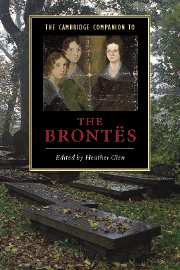Book contents
- Frontmatter
- Introduction
- 1 The Haworth context
- 2 'Our plays': The Brontë Juvenilia
- 3 The poetry
- 4 'Three distinct and unconnected tales': The Professor, Agnes Grey and Wuthering Heights
- 5 'Strong family likeness': Jane Eyre and The Tenant of Wildfell Hall
- 6 Shirley and Villette
- 7 'Getting on': ideology, personality and the Brontë characters
- 8 Women writers, women's issues
- 9 The Brontës And Religion
- 10 The Brontë myth
- Further reading
- Index
- Series List
9 - The Brontës And Religion
Published online by Cambridge University Press: 28 May 2006
- Frontmatter
- Introduction
- 1 The Haworth context
- 2 'Our plays': The Brontë Juvenilia
- 3 The poetry
- 4 'Three distinct and unconnected tales': The Professor, Agnes Grey and Wuthering Heights
- 5 'Strong family likeness': Jane Eyre and The Tenant of Wildfell Hall
- 6 Shirley and Villette
- 7 'Getting on': ideology, personality and the Brontë characters
- 8 Women writers, women's issues
- 9 The Brontës And Religion
- 10 The Brontë myth
- Further reading
- Index
- Series List
Summary
Although the Brontës' lives are obviously inscribed within a world of Victorian religion from their births as daughters of a clergyman to the final death of survivor Charlotte in the loving arms of her curate husband, although their works are filled with striking and prominent religious characters and scenes turning on religious issues, critics of the twentieth century did not much view the Brontës within religious structures of understanding. Issues of psychology, sexuality, feminism, social power, even the apparently far-removed worlds of colonial and imperial England preoccupied us far more. Nor was this merely a matter of the good reasons, which I shall attempt to provide below, for not inscribing the Brontës into one or another simple religious construction, of their age or ours; and for not seeing their vision as ultimately focused, as say Christina Rossetti's was, on religion, especially not on religious ultimates. Even their world of death was not seen as the traditional one of death and the afterlife but, as with the Brontës' other contemporary Dickens, this world of the dead and dying.
On the whole, unless the religious issues were so central as to brook no avoidance – for instance in Tennyson’s In Memoriam, the priest Hopkins’ sonnets, Newman’s Apologia, or the very different representations of Trollope’s familiar world of Barsetshire clerical politics – we did not search with interest for religious themes.As the twentieth century turned away from those overstuffed Victorian memoirs of life and letters, they turned away from the obvious but rather unwelcome evidence of the age’s obsession with religion.
- Type
- Chapter
- Information
- The Cambridge Companion to the Brontës , pp. 192 - 213Publisher: Cambridge University PressPrint publication year: 2002
- 4
- Cited by



